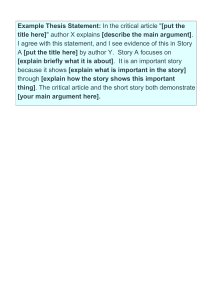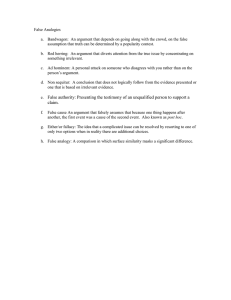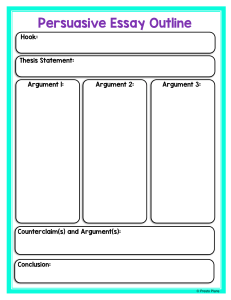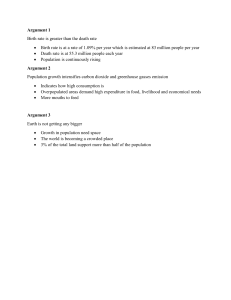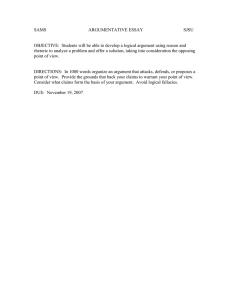Research Methods: Opinion, Fact, Evidence & Argument Analysis
advertisement
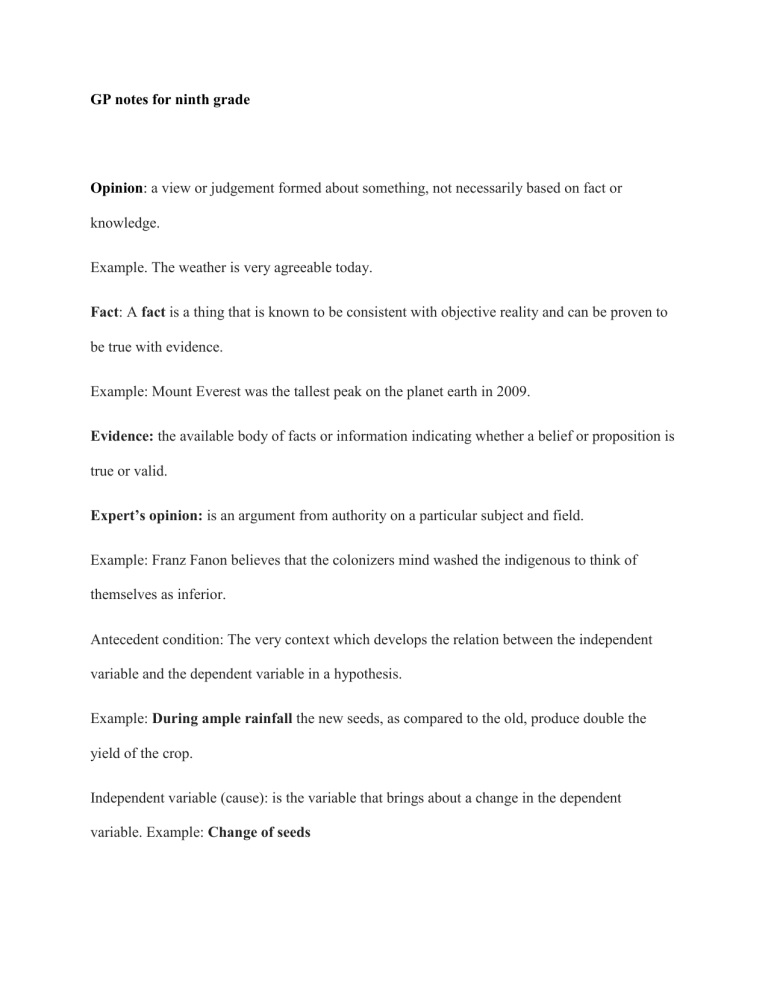
GP notes for ninth grade Opinion: a view or judgement formed about something, not necessarily based on fact or knowledge. Example. The weather is very agreeable today. Fact: A fact is a thing that is known to be consistent with objective reality and can be proven to be true with evidence. Example: Mount Everest was the tallest peak on the planet earth in 2009. Evidence: the available body of facts or information indicating whether a belief or proposition is true or valid. Expert’s opinion: is an argument from authority on a particular subject and field. Example: Franz Fanon believes that the colonizers mind washed the indigenous to think of themselves as inferior. Antecedent condition: The very context which develops the relation between the independent variable and the dependent variable in a hypothesis. Example: During ample rainfall the new seeds, as compared to the old, produce double the yield of the crop. Independent variable (cause): is the variable that brings about a change in the dependent variable. Example: Change of seeds Dependent Variable (effect): is the variable that changes because of the independent variable, example: Yield of the crop. Testing a Claim: In this question the students are only required to develop a research methodology and nothing more. The language of the answer is ought to be in future tense. The students are required to develop their points with regard to method, sources and targeted information. The methods that can be used: Primary research: sources (depends on the kind of research question) Definition: Is a kind of research that requires the researcher to collect the data directly from the source. Methods: Surveys, Interviews and Observation. Secondary research: Definition: Is a research in which the researcher validates the claim by using another’s data. Method: Reading and Watching Sources: Scholarly books and Articles, Newspaper, Magazines, Documentaries etc. Sample Question: “War can cause massive demographic changes” How will you test the given claim? What kind of method, information and sources of evidence will you use? (8) Sample Answer: To test this claim, I would begin my research by secondary research methodology. Firstly, I would do a historical survey of the wars fought in 1914 to 1945 to see whether there was a change in demographics. For this I will use archival data. Secondly I will survey the demographic changes that occurred from 2010 to 2018 and will see how the many of the populous had to shift because of the war. For this I will use scholarly articles published on the subject. Furthermore I will watch documentaries to see if there are other prominent reasons for a shift. Shifting to primary research, I will conduct a survey from a randomly selected populous to see whether they would want to move to another place if war did come about. I will also interview strategists to check whether war is a factor that cause massive demographic shifts. Testing an argument. Students are mostly required to simply analyze the argument for strengths and weaknesses. The students are not required to give opinion or argue for or against the topic. The only thing that is required for them is to only stick to the given text. Strengths If the argument is support by relevant factual evidence. If the factual evidences are properly cited. If a relevant expert opinion is present If proper authority of the expert is constructed through either words like professor or doctor, or through references given at the end. If peoples opinion are taken on the subject (other than the author) If personal opinion is given. If a reference is given by the end of the passage. If proper date is given in the reference. Weaknesses If the factual evidence is partially or completely irrelevant If the factual evidence lacks citation If the expert’s opinion is partially and completely irrelevant If the expert’s authority is not properly developed If the reference at the end of the passage is missing If present, clarity is missing If the date in the reference is missing If the argument is outdated If the author had made hasty generalization (rawing a conclusion based on a small sample size, rather than looking at statistics that are much more in line with the typical or average situation.) If the author has commits ad hominem (Attacking the person making the argument, rather than the argument itself, when the attack on the person is completely irrelevant to the argument the person is making.) If the author has commits red herring (A red herring is something that misleads or distracts from a relevant or important issue. It may be either a logical fallacy or a literary device that leads readers or audiences towards a false conclusion.) If the author uses an argument from emotion (Appeal to emotion or argumentum ad passiones ("argument from passion") is a logical fallacy characterized by the manipulation of the recipient's emotions in order to win an argument, especially in the absence of factual evidence).
